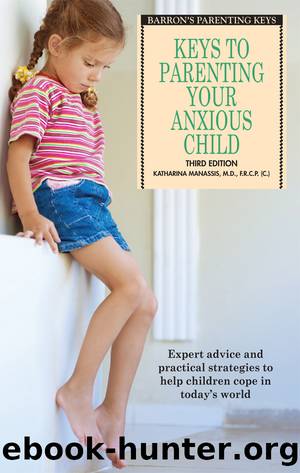Keys to Parenting an Anxious Child by Katharina Manassis

Author:Katharina Manassis
Language: eng
Format: epub
Publisher: Barron's Educational Series, Inc.
Published: 2015-09-15T00:00:00+00:00
20
SPECIFIC MEDICATIONS FOR ANXIETY
Two types of medications are commonly used to treat anxiety: antidepressants and benzodiazepines.
Antidepressants
Antidepressants alter the balance of various chemicals in the brain, affecting mood. They also appear to block some of the more severe physical and psychological symptoms associated with anxiety. In children, these medications have been used for depression, Obsessive-Compulsive Disorder, and all anxiety disorders. Most of these medications have generic names ending in the suffix -ine.
Effectiveness
Antidepressants do not act immediately. They take an average of two to six weeks to reach their full effect. Thus, you canât be certain whether or not the medication is working until the child has been taking it continuously for several weeks. The body does not become used to antidepressants, so these drugs can be used effectively for months or even years.
Your doctor usually estimates the dose of these medications according to your childâs weight and age. As children grow and develop, they may need increased amounts of medication. The starting dose will often be low, because fewer side effects tend to be experienced when one starts low and gradually builds up to the recommended dose. Most medications cause less discomfort when starting and stopping them are done gradually. In some cases, a blood test can be done to check that the dose is the right one for your child and that the medication is not causing harm to any of the bodyâs organs.
Side Effects
Side effects vary according to the type of antidepressant. Some children experience no side effects, whereas others experience many. Older antidepressants termed tricyclic antidepressants can cause dry mouth, constipation, and tiredness. Sometimes they can also affect the rhythm of the heart, a dangerous but rare side effect, so children taking them need periodic electrocardiograms. For these reasons, they are used less frequently now than in the past.
Fluoxetine, Fluvoxamine, Sertraline, and other antidepressants that act specifically on the brain chemical serotonin (called selective serotonin reuptake inhibitors, or S.S.R.I.s) are used most commonly. Nausea, headaches, restlessness, and sleep problems are their common side effects. Taking these medications at a specific time of day (in the morning for the more energizing ones, in the evening for the more sedating ones) tends to reduce sleep problems. The nausea and headaches are most common early in treatment and tend to decrease with time. Several studies have now shown them to be effective for anxious children, and there is no strong evidence that any serotonin-specific medication is superior to the others. The largest study to date used Sertraline, alone and in combination with CBT. Children improved more with combination treatment than with Sertraline alone.
Concerns have been raised about the potential for these medications to increase thoughts of suicide in some people. Most of the time, this has been reported in people with depression (rather than anxiety), and it occurs infrequently (less than 5 percent of the time, even in depressed people), but it is still a valid concern. For this reason, it is important that your child sees the doctor regularly when taking these medications, especially in the first few weeks when the risk is highest.
Download
This site does not store any files on its server. We only index and link to content provided by other sites. Please contact the content providers to delete copyright contents if any and email us, we'll remove relevant links or contents immediately.
Substitute Parents by Gillian Bentley Ruth Mace(738)
Sex positions - 2 Books in 1 - Kama Sutra and Tantric Sex Guide for Couples by Transform Your Sexual Life.pl(392)
How to Raise an Mvp by unknow(319)
Parents Ask, Experts Answer by Tina Nocera(300)
The Reluctant Single Dad: A Grumpy, Damaged Brother's Best Friend Romance by Cayla Lucas(277)
How to Hire a Nanny by Guy Maddalone(212)
Being the Mom by Emily Watts(198)
Making Children Mind without Losing Yours by Kevin Leman(186)
The Surprising Purpose of Anger (Nonviolent Communication Guides) by Marshal B. Rosenberg(183)
Power of Mothers by Celia Lashlie(165)
When You Say 'thank You,' Mean It by Mary O'Donohue(160)
Questions Kids Ask about Sex by J. Thomas Fitch(153)
The MicroRNA Quantum Code Book by Unknown(151)
Holding On And Hanging In by Lorna Miles(151)
40,001 Best Baby Names by Diane Stafford(145)
I Didn't Do It by Unknown(144)
Loving Your Child Too Much by Tim Clinton(137)
The Everything Parent's Guide to Raising a Gifted Child by Sarah Herbert Robbins MEd(129)
26.2 books MH DB new by Gribbin & Simon(128)
